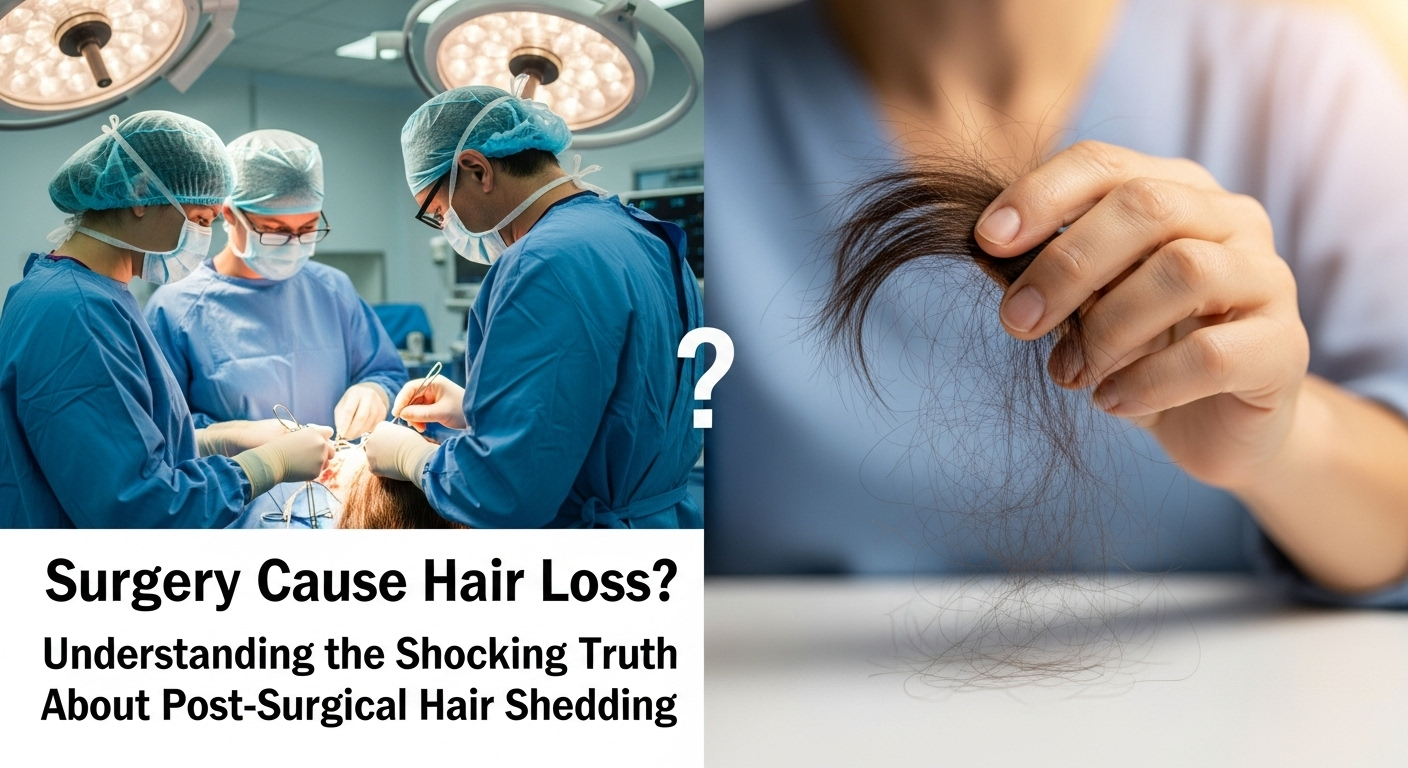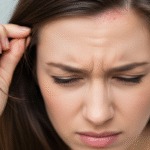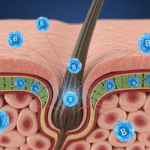Worried your upcoming operation might trigger unexpected thinning or bald patches? Wondering, does surgery cause hair loss? You’re not alone—many people notice increased shedding a few months after a procedure. This article explains how surgical stress, anesthesia, positioning, or nutritional changes can temporarily disrupt hair growth. You’ll learn about timelines, prevention strategies, expert recommendations, and …
Worried your upcoming operation might trigger unexpected thinning or bald patches? Wondering, does surgery cause hair loss? You’re not alone—many people notice increased shedding a few months after a procedure.
This article explains how surgical stress, anesthesia, positioning, or nutritional changes can temporarily disrupt hair growth. You’ll learn about timelines, prevention strategies, expert recommendations, and when to seek medical help—so you can recover with both your health and your confidence intact.
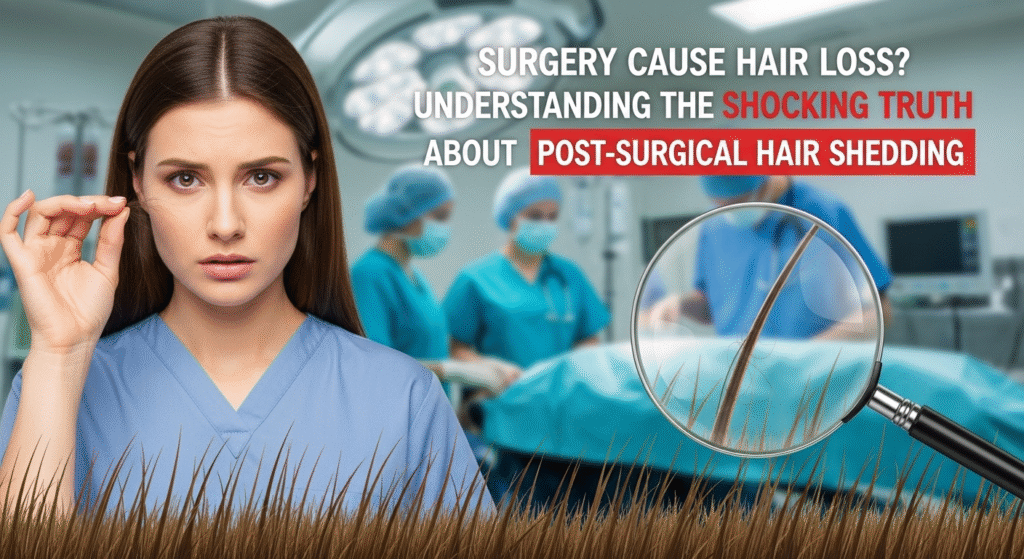
Does Surgery Cause Hair Loss (Post-Surgical Telogen Effluvium)
Definition and explanation of telogen effluvium after surgery
Telogen effluvium (TE) is the most common cause of hair loss after surgery. It occurs when a sudden physical or emotional stressor pushes hair follicles from the growth (anagen) phase into the resting (telogen) phase prematurely.
This shedding typically becomes visible two to three months later. Surgical procedures—especially major ones—are significant stress events that can trigger this process.
Role of physical and emotional stress
The body treats surgery as trauma. The combination of tissue injury, anesthesia, blood loss, and recovery strain diverts resources from non-essential processes—like hair growth—toward healing vital organs. Emotional stress (anticipation, recovery challenges, pain) can compound the effect, increasing the percentage of follicles entering telogen phase at once.
Other Causes Linked to Surgery-Related Hair Loss
Anesthesia-related factors and alopecia areata
While anesthesia itself is rarely a direct cause of hair loss, it can contribute indirectly by altering blood flow or immune responses. In rare cases, anesthesia may trigger autoimmune reactions like alopecia areata, leading to sudden patchy loss.
Positional or pressure alopecia
Prolonged immobility during lengthy surgeries can compress scalp blood vessels, leading to localized hair loss known as pressure alopecia. Patients positioned in Trendelenburg (head down) or with fixed head supports for hours are most at risk.
Medication side effects
Drugs given during or after surgery—such as beta-blockers, anticoagulants, or certain antibiotics—can cause temporary hair shedding as a side effect. This is especially true when combined with post-op stress and nutritional depletion.
Nutritional deficiencies
Surgery can reduce appetite, alter digestion, or limit nutrient absorption—especially in bariatric procedures. Deficiencies in iron, protein, zinc, and B vitamins impair follicle function, slowing regrowth and increasing shedding.
Types of Surgery Most Commonly Linked to Hair Loss
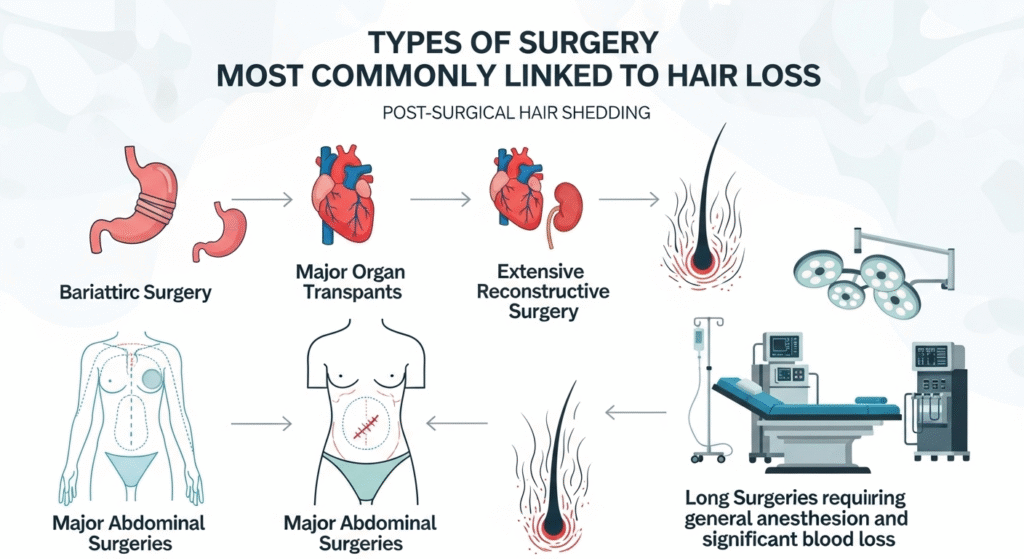
Bariatric and weight-loss surgeries
Rapid weight loss and nutrient malabsorption make hair shedding common after gastric bypass or sleeve gastrectomy. Studies show up to 40% of patients experience TE within six months post-op.
Long-duration surgeries
Operations lasting several hours (e.g., cardiac, orthopedic) increase the risk of pressure alopecia and stress-induced TE. The combination of extended anesthesia, blood pressure changes, and prolonged head positioning heightens vulnerability.
Surgeries involving scalp incisions
Procedures like facelifts or cranial surgery can directly disrupt follicles at the incision site, causing temporary or permanent hairline changes.
Timeline: When Hair Loss Starts and How Long It Lasts
Onset: 2–3 months post-surgery
Hair shedding rarely starts immediately after surgery. The delay reflects the hair cycle’s natural rhythm—follicles enter resting phase during the trauma, but strands are only shed weeks later.
Regrowth: 4–8 months after onset
Once the body recovers and nutrients are replenished, follicles re-enter the growth phase. Most patients see substantial regrowth within 6–12 months. Complete recovery depends on age, health, and surgery type.
Prevention and Post-Surgical Hair Care
Nutritional optimization
Maintain a diet rich in lean protein, iron, zinc, and vitamins A, C, D, and biotin before and after surgery. Supplement if medically recommended—especially after bariatric surgery.
Communication with your surgical team
Ask about head positioning, anesthesia type, and strategies to minimize scalp pressure. For lengthy procedures, request repositioning breaks if possible.
Gentle hair care routines
Use sulfate-free shampoos, avoid excessive heat styling, and minimize chemical treatments during recovery.
When to seek medical evaluation
If shedding lasts longer than six months, is patchy, or comes with redness or pain, consult a dermatologist. This could indicate alopecia areata, scarring alopecia, or another treatable condition.
Real Experiences and Expert Input
Case study suggestion:
A 35-year-old woman experienced diffuse thinning three months after gastric bypass. With nutritional counseling and gentle hair care, she regained full density by month nine.
Visual suggestion: Recovery timeline chart showing:
- Surgery date
- 2–3 months: shedding begins
- 4–8 months: regrowth phase starts
- 12 months: full recovery
FAQs
Does surgery always cause hair loss?
No—many patients never notice significant shedding. Risk depends on surgery type, duration, health status, and recovery care
Can anesthesia cause permanent bald spots?
Rarely. Most hair loss linked to anesthesia is temporary. Permanent loss may occur if scalp blood supply is severely disrupted.
What is pressure alopecia?
A localized loss caused by prolonged scalp pressure during surgery. Prevention includes adjusting head position during long operations.
When should I see a dermatologist?
If shedding is severe, lasts beyond six months, or is accompanied by pain, scaling, or redness.
Are there treatments to speed regrowth?
Yes—minoxidil, nutritional supplements, and low-level laser therapy may help, under medical supervision.
Ready To Take Your Next Step
If you’ve noticed unusual shedding after surgery, don’t panic—most cases resolve naturally. Focus on balanced nutrition, gentle care, and regular check-ins with your doctor. For peace of mind, book a consultation with Dr. Uzma Irfan, an ISHRS-certified surgeon in Islamabad to get a personalized recovery plan.

